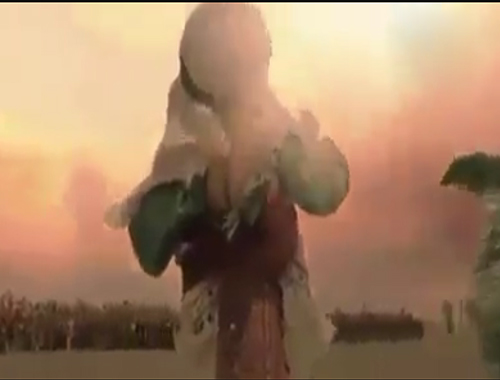verse33
- Details
- Hits: 2448
(33) إِنَّمَا جَزَاء الَّذِينَ يُحَارِبُونَ اللّهَ وَرَسُولَهُ وَيَسْعَوْنَ فِي الأَرْضِ فَسَادًا أَن يُقَتَّلُواْ أَوْ
يُصَلَّبُواْ أَوْ تُقَطَّعَ أَيْدِيهِمْ وَأَرْجُلُهُم مِّنْ خِلافٍ أَوْ يُنفَوْاْ مِنَ الأَرْضِ ذَلِكَ لَهُمْ خِزْيٌ فِي الدُّنْيَا
وَلَهُمْ فِي الآخِرَةِ عَذَابٌ عَظِيمٌ
33. " The only recompense of those who make war against Allah and His messenger, and strive to make mischief in the land, is that they be killed or crucified, or their hands and their feet be cut off from opposite side or they be banished from (their) land. This is a degradation for them in the world, and in the Hereafter, they will have a grievous chastisement."
Commentary:
Upon the occasion of revelation of this verse, it is cited that: a group of pagans came to Medina and then they became Muslim. They were tired and sick, therefore, the Prophet (p.b.u.h.) ordered that they would be taken in a good climate rigion outside Medina where they were permitted to enjoy of the milk of the alms-tax camels therein. When they gained their health, they took the Muslim shepherds, who were living thereabout, and cut off their hands and feet, blinded their eyes, and plundered the camels. They left out Islam, too. The Messenger of Allah (p.b.u.h.) ordered that they would be captured and be treated with the same manner as they had done upon the shepherds. Then, in this circumstance the above mentioned verse was revealed.
These retributions, which are mentioned in the verse under discussion, are counted ' rights of Allah ' and they are not forgiveable and changeable. (Atyab-ul-Bayan).(1)
However, in order to improve the society, not only admonishment and guidance are necessary, but weapon and severe revolutionary treatment are needed. (The words in the previous verse were some educational messages and warnings unto the murderer. Now, in this verse, the statement is upon the punishment of the one who fights against Allah and makes mischief.)
The noteable point here is that fighting against the servants of Allah is the same as fighting against Allah. So, the one who stands against people, is like that he has stood against Allah.
Therefore, there have been decreed several kinds of punishment for those who disturb the security of the society. These punishments are: execution, banishment, cutting off the hand and the foot, and to hang such wick persons.
In the meantime, Islamic punishments are accompanied with justice. Since corruptions and the qualifications of the mischief-makers are different, the retributions are not the same, either. If the mischief has been committed tragically, its punishment is slaughter. But, if it is superficial, its retribution is banishment. Concerning such punishments, this fact is understood from the Islamic traditions that: the retribution of homicide is execution; the retribution of terrorising is banishment, the retribution of larceny is cutting off the hand and the foot; the retribution of murder and orbbery (with arm) is cutting off the hand and the foot and being hanged. (At-Tafsir-us-Safi)
Also, it is cited in Usul-i-Kafi that one of the meanings of the phrase ' be banished from their land ' (mentioned in the verse) is throwing such a person in the sea. (Al-Kafi, vol. 7, p. 267)
Explanations:
1- The responsibility of the government and rulers is to protect the security of the society in cities, villages, roads, and so on.
2- Those opponents of the mastership of the Messenger of Allah (p.b.u.h.) whose intention is destruction and who fight against the godly system, should be dispersed.
3- Those who rise against the Muslims leader, or against the Islamic government, are among ' those who make war against Allah '. (At-Tafsir fi-Zilal-il-Qur'an)
4- Imam Rida (a.s.) said: " The length of the time of banishment for the mischief-maker is one year. The place of banishment should be announced to people in order that they break their communication with the banished person, and stop bargaining, holding familiar intercourse, and marriage with him." (Tafsir-i-Nur-uth-Thaqalayn)
5- According to a verse of the Qur'an,(2) a usurer is also counted among ' those who make war against Allah ', since such a person disturbs the economical security in the society.
Also, as some Islamic traditions indicate, disgracing a Muslim believer is considered as fighting against Allah.(3)
(1) It is cited in Al-Mizan that the choice of one retribution out of these four retributions is up to the leader of Muslims. So, even when the possessors of the blood of the slain remit, one of the retributions must be executed.
(2) Sura Al-Baqarah, No. 2, verse 279
(3) Bihar-ul-'Anwar, vol. 5, p. 283











